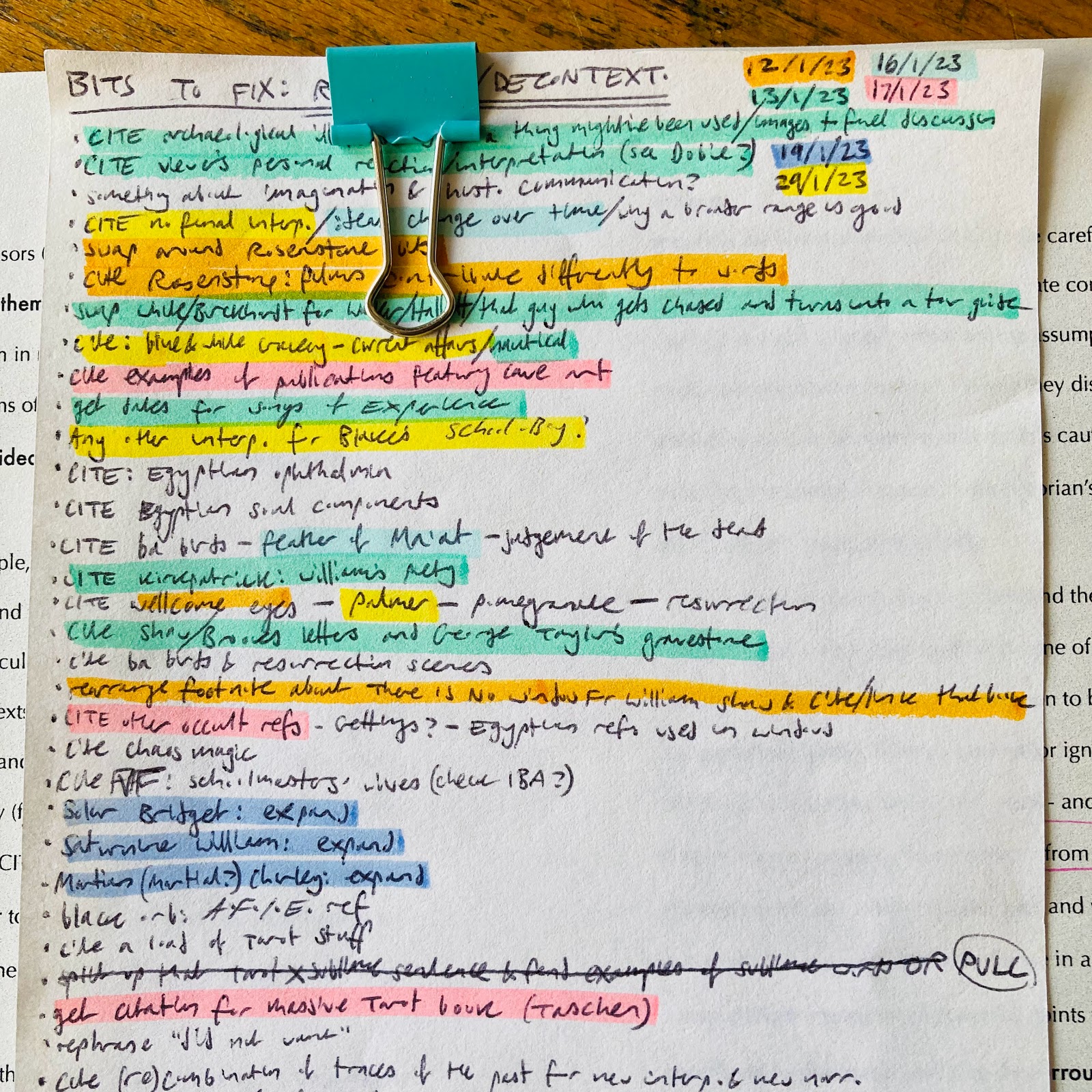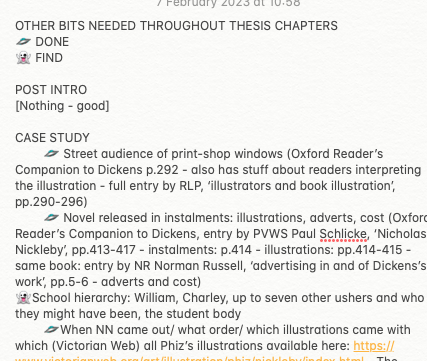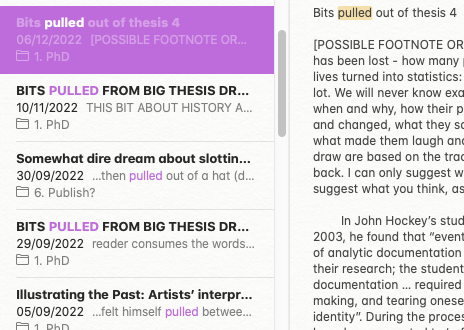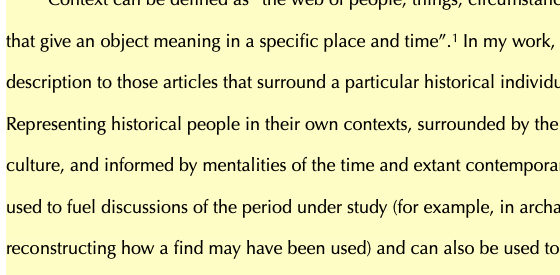I'm in the middle of doing my thesis and it is an absolute ride!
These things (not shown in any particular order) are all things that (usually) work for me - not everything works for everyone, but they might give you some ideas.
(Also you might be doing a dissertation or a giant essay or something else arduous)
Stretch your damn hands
Make sure you do it safely!
Go on YouTube and look for wrist stretches, hand stretches, etc. You’re typing for a long time and it’s not doing you any favours. Here’s some stretch videos I've tried. (I'll keep updating that playlist as I try more!)
Also stretch your neck and any other body parts that might get upset - stand up regularly - I’ve got a standing desk (actually an old teacher’s desk) - move about, dance, get the blood flowing.
“But it’ll interrupt my glorious academic work!” Oh you silly twit. Stretching will take a couple of minutes, and your hands need to remain functional. Your health is worth more than some expensive letters after your name. Damaging yourself for the sake of achievement is not a good look.
[ALL CAPS SHOUTY BRACKETS]
When I’m writing, when I don’t know something and I need to keep going but I can’t be bothered to leave the document/ break the flow/ try finding whatever missing piece of information, I use these. It’s just square brackets [SHOUT AT YOURSELF TO FIX THE SENTENCE OR WHATEVER] and continue like nothing’s happened.
 |
| [INSTRUCTIONS FOR ME FOR LATER] |
Later, when you’re checking your draft and finding things to fix, these stand out!
Lists
I go through each chunk/ chapter/ whatever of my thesis, and I make lists of the bits that need fixing. I do exactly the same when my supervisors read the thesis extracts that I send them - they give me feedback, which I turn into lists.
Then I go through the lists - I usually tackle the easier stuff first - then that stuff is gradually eliminated, and the harder stuff ends up having easier bits - it’s all relative.
 |
| Some days are better than others and that's ok |
I colour-code my lists so I know what I did and when I did it. This is just for my own amusement, and I can see how many things I crossed off at the end of each day’s work. I like a different colour pen each day! (If you haven’t got many pens, or don’t like the multicoloured look, you could make up a snazzy new pattern for crossing out every day - +|+|+|+, o0o0o0o, *∆*∆*∆*∆*, +x+x+x+ - whatever.)
 |
| This list is for things that need citing. When I've found something and shoved it in a footnote, I give it a 🛸 flying saucer. If I still need to find it, I give it a 👻 ghost. |
Sometimes you find a thing on your list that doesn’t even need doing! Some redundant paragraph that needs fixing - actually, it doesn’t fit there - rip it out! And that is quite satisfying.
Saving stuff for later
When you rip things out of your thesis (sentences, quotations, paragraphs, massive chunks, etc.) - save them! Make a new document and stick them in there. Sometimes you might need to refer to them later. It’s satisfying to hit delete, but very Not satisfying when you know you had something useful and you cannot find it anywhere FFS why, where the hell is it, If Only I’d Saved It [screaming]
 |
| I go into the Notes app, I search for the word "pulled", and I get all sorts of stuff! |
Similarly, every time I start a new draft, I make a duplicate of the current draft - which then becomes the old draft, and the duplicate becomes the new draft. I work on the new draft, and save the old drafts.
 |
| Those documents beginning with the word "pulled" are full of bits I've pulled out of each chapter. |
And also back everything the hell up! My mum, who is a strong technophobe, knows that technology is not to be trusted, and regularly reminds me to back everything up. I keep backups on iCloud and on a USB stick.
Regarding the bits that you’ve pulled out and saved: even if you don’t use them in your thesis, you’ve got the entire rest of your life to do stuff with them if you want. They could spark off your future publications. If you don’t use them, that’s ok - they’re just practice, like rough drawings in sketchbooks.
Regular breaks
When I get my teeth into something, I push hard. When I started the PhD, I was taking no breaks, and I was courting burnout. Now, I make sure I have two days off a week (which are for Me and nobody/ nothing else). My pattern each week is work for three days, day off, work for two days, day off. The days off allow my brain to settle/ stew, and I come back fresher.
If you have an intense stint, or you’re coming up to finishing a list, once you’re done, Leave It Alone. Just leave it for a week. Let your brain settle. Do something else - if you can’t leave the entire damn PhD alone (like me), there’s plenty of other stuff you can do: relevant reading, go over some older work and evaluate it, make new work, make blog posts/ other content about your work, etc. Resist the temptation to go back to your thesis!
Meanwhile, somewhere in your head, your brain is making connections and doing other incredible brain stuff (don’t ask me) and, when you come back to your thesis, you’ll be able to look at it with better clarity.
My therapist told me about the fertile void which is (sometimes) when you take a break which helps you come back with more energy. You’re not just hurtling from one thing to another - you’re able to process stuff.
Taking breaks is good for you!
Communication/ rants
Other people’s viewpoints are incredibly useful! Even just a brief chat with your mate (make sure you ask them if they’re willing to hear thesis misery) can lead you to “Hang about, that’s a good point and I’ve seen literature on that, I need to stick that in”.
A really good thing that my dad pointed out: the thesis is the hardest piece of writing I’m ever going to do. Once it’s over, I can do anything I like.
Looking at the document is Hard
Sometimes I have these horrid psychological blocks where I can’t even open up the thesis document. Sometimes, I can open it, but I can’t look at the words - it’s weird, it’s like it makes me feel ill, but like not physically? It’s like Bad Vibe [indistinct groaning] I can’t describe it in words.
There’s several things you can do here. (Or several things that I can do. I dunno if they’d work for anyone else, but they might be worth a try.)
- Break time. Leave it alone. Try again later.
- Stretch!
- Do something else PhD-flavoured: read a chapter of that book (you never know when an author’s gonna save your arse), go trawling for papers on your university library website/ JSTOR/ ResearchGate/ Academia.edu/ T&F/ wherever else, have a vague no-pressure think about some postdoctoral stuff or ideas for further research (write it down and you could stick it in your conclusion later), whatevs.
- Do something else PhD-flavoured but sideways: for example, if you’re doing something with a specific historical case study, find music or recipes contemporary with that. I like reading magazines and educational materials contemporary with my lot (but I have to stop because I find it all hilarious and it turns into a distraction).
- Remember your achievements! You started [however many] years ago and now you’re Here. Look at your older work - this is something else I love, I get out old sketchbooks and look at my old drawings, and yeah, they’re alright, then I get out my newer stuff and believe myself to be an absolute genius because of how much I’ve improved. (And I intend to keep improving.)
- Choose one tiny thing to fix. One small citation, or a fragment of a footnote, or something. Just do that. This can give you a bit of momentum to do another tiny thing, which is excellent! If not, never mind and congratulations! You just improved your thesis! Every tiny thing is still progress!
- Leave your desk! Time for a walk! Or something else that helps you calm down/ gives your brain time to reload!
Change the font/ paper colour/ highlight colour/ whatever
Words still difficult? Does it all look the same all the damned time? This tricks your brain into thinking that you’re looking at a new/ different piece of work.
 |
| I've got used to reading stuff on this background |
 |
| Oh my days, it's completely different! (Haha my brain fell for it, and now I can get on with my work) |
The good people of Reddit have more on this.
Break it into chunks
A huge massive thesis document can get overwhelming. Chop it up - have a few documents, perhaps one each for the introduction, chapters, conclusion, etc. Put it back together again later.
 |
| I like to print mine out and annotate them |
If you print them out, sometimes it's easier to compare your sections rather than switching between windows on a screen. Also it's fun to pretend that you're a detective and you've got to deal with reports.
Don’t be a perfectionist (especially at the start)
Get stuff written down/ drawn/ whatever! If you have an idea, get it down before you forget it! Write really rubbish stuff in your first draft - don’t mess about trying to get the perfect turn of phrase or whatever - that can be fixed later. Loads of mine has broken sentences, things written how I speak in real life, all sorts of nonsense, immediately followed by [SQUARE BRACKETS REPHRASE LATER GET CITATION WHATEVER] and all that sort of thing. Here’s some good words from Neil Gaiman.
Bulk and cut
Basically, stealing and adapting part of a strategy that some people use in training, and applying it to word count. This article explains more on the physical side. (I’ve never seriously done it in my own training, partly because I don’t fully understand it - I just use it as a metaphor.) In a bulk phase, you’d take on surplus calories, and in a cut phase, you’d aim to be in a deficit - apply that to words.
Surplus: bulk the thesis up - I pack it full of words, I fill it with almost-stream-of-consciousness writing, I pile in loads of spicy quotes from elsewhere.
Deficit: after leaving it alone for a bit, I cut it down. I go in and streamline it.
Never mind if the words in your bulk phase are silly - get the word count up. There will be rubbish in there - this is where it diverges from the physical version, where you’re only meant to eat good stuff in your bulk phase, but in a thesis, just slam everything in there. You’re after the word count target.
 |
| I like to think that I'd be a nicer trainer than this. Sometimes I shout at my thesis and make it lift books. |
When you’re bulking your thesis up, you can see the word count rising massively, and this feels great! When you’re cutting it down, you know that you’re getting rid of any unnecessary stuff and you’re improving the quality of the thing, and this also feels great!
One rep at a time
Even adding one citation, fixing one sentence, etc., is something - you’ve done something and improved your thesis. Even if you later pull that bit out (save it for later!) you’ve still gained experience at learning what works and what needs improvement.
This is a thing I learnt from lifting - if it's super hard, just focus on one rep at a time. (Make sure it's decent - maintain good form, don't swing your dumbbells, etc.) Then another one. Then another one. Before you know it, the timer goes off and you can rest!
In thesis terms, focus on one tiny bit at a time. Are you editing/ proofreading? Here's a sentence. Tighten it up. Move onto the next one. Then the next, and the next, and - suddenly, you're at the end of the section and you've done some quality work!
Decent playlist
I find that music (or lack thereof) influences what I make, whether it’s images or words. I’ve got specific playlists for drawing different characters or vibes. Same with the thesis - I like EDM with no/ few words. (Current fave: No Mana's What's Your Wifi.) Some people prefer video game soundtracks, which are designed to be motivating but not distracting.
Also, when you need a break, stick your favourite songs on and have a dance! Alternatively, before you start, listen to music that gets you hyped and makes you want to fight your thesis - currently I'm enjoying Blind Channel's Balboa (violent pop/ sort of nu-metal, nicely aggressive with very relevant lyrics about overcoming challenges) and Kasabian's Switchblade Smiles (electronicky indie-ish rock, slow build that increases in intensity, generally uplifting vibe).
Alrighty, that's some of my best Hot Thesis Secrets! Hopefully there's something useful in here that can help you push through. COME ON YOU CAN DO IT 💪
(I’m not saying how to cope with writing a thesis - not all of us do 100% written thesiseseseses that is a silly word, and I hate “thesi” because it sounds pretentious, and I hate the plural “theses” because it’s begging for a poo joke, although I suppose there is a great deal of satisfaction in finishing, ok never mind)













